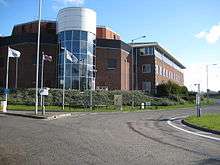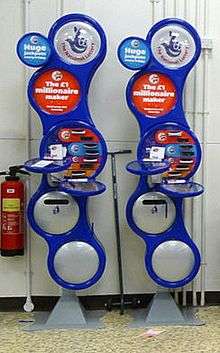Camelot Group
 | |
 Camelot Head Office in Watford | |
| Private[N 1] | |
| Industry | Lottery |
| Founded | 27 March 1998 |
| Headquarters | Watford, England, UK |
Area served | United Kingdom |
Key people | Nigel Railton (CEO) [1] |
| Products | National Lottery[N 2] |
| Revenue |
|
|
| |
|
| |
Number of employees | 750 |
| Parent | Ontario Teachers' Pension Plan |
| Website |
www |
Camelot Group[N 1] are the operators of the UK National Lottery. Camelot Group was awarded the National Lottery franchise in May 1994[2] (though the lottery did not start until November 1994) and was re-awarded the franchise in 2001 and again in 2007.[3] The current franchise period started in 2009 and runs until 2019, with a possible extension of up to five years.[4] The governmental body the Gambling Commission is responsible for deciding who is awarded the franchise. The way the franchise was awarded to Camelot in 2001 caused some controversy, because state-owned Royal Mail held a 20% stake in the Camelot Group.[5]
In March 2010, Ontario Teachers' Pension Plan from Canada announced that it was buying Camelot for £389m.[6][7]
History

Camelot was formed as a consortium to bid for the National Lottery project. The major partners were International Computers Limited (ICL), supplying hardware, software, and systems integration expertise; Racal with responsibility for the communications network; and Cadbury Schweppes bringing experience in consumer marketing and knowledge of the world of corner-shop retailers. De La Rue brought knowledge of secure printing technology, and GTECH Corporation were brought in as the selected supplier of applications software. Staff were seconded from the partner companies, transferring to Camelot Group when the bid was won.[8]
Senior executives such as Tim Holley were enticed to join the project by the promise of large bonuses if the bid was successful. This caused embarrassment later when the incoming Labour government, in particular Chris Smith, the Culture Secretary, publicly criticised Camelot and its executives for excessively lavish salaries and bonus payments.[9]
The Camelot name is reflected in the actual lottery machines used in the National Lottery draw, which are named for characters, places, and objects in Arthurian Legend (Guinevere, Lancelot, Excalibur, Arthur, etc.).[10]
2000/2001 franchise controversy
Two companies competed for the National Lottery franchise in 2001: Camelot, the incumbent operator, and a rival operator called "The People's Lottery", organised by Sir Richard Branson.
During the 2000 franchise bidding process, a technical problem with lottery terminals supplied by American company GTECH Corporation came to light. It was discovered that this technical problem may have inadvertently caused winners to be paid incorrect amounts. Because of this problem and the relationship between Camelot and GTECH, the National Lottery Commission recommended that the lottery franchise be awarded to the People's Lottery. GTECH had been a shareholder in Camelot Group but they sold their shareholding to Camelot Group, and the remaining shareholders increased their stakes from 16.66% to 20%.[11][12]
In August 2000, the chair of the National Lottery Commission, Dame Helena Shovelton, announced that neither party would be invited to run the National Lottery, claiming that neither party met the statutory requirements to run the lottery. It was felt that legal problems were responsible for the downfall of the People's Lottery bid, while the relationship between G-Tech and Camelot was the reason Camelot would not be invited to run the lottery. Although neither bid met the statutory requirements, the Commission still tried to award the franchise to the People's Lottery.[13][12]
By September 2000, it was clear that although neither party met the statutory requirements to run the lottery, the Commission was going to award the franchise to the People's Lottery. Camelot initiated legal action, taking the Commission to the high court for a judicial review. The High Court judges sided with Camelot, describing the Commission's decision as "conspicuously unfair". The National Lottery Commission responded by dismissing the HM Treasury legal team who had been advising them. Dame Helena resigned shortly afterwards and was replaced by Lord Burns.[14][12]
During November, the National Lottery Commission reopened the bidding process and both parties resubmitted their bids, the commission hoped to announce the winner by mid-December. On 19 December 2000 the commission announced that Camelot would be awarded the franchise, with voting 4-1 in favour of Camelot.[15] One member later resigned from the commission over the process, deeply unhappy that Camelot had been re-awarded the franchise. It was during the second bidding process that Camelot agreed to buy out shareholder G-Tech's stake in the company. Sir Richard Branson threatened to take further legal action; but faced with the prospect of a lengthy and costly legal battle, one which could have resulted in the National Lottery games being suspended, he backed down.[12]
2009 licence
Camelot's third licence period started on 31 January 2009; the money given to good causes was increased, and retailers' commission increased from 5% to 6%. The third licence is for a ten-year period with the option to extend by a further five years.[16] In March 2009, Camelot announced a programme of redundancies to cut costs throughout the company.[17]
In March 2012, the National Lottery Commission extended Camelot’s Licence by four years to 2023, on condition that Camelot deliver an additional £1.7 billion in lottery funding to good causes.[18]
In October 2013, Camelot doubled the ticket price of its main National Lottery game, Lotto, to £2, with the aim of increasing ticket sales.[19] Analysts noted that in the subsequent two-year period, funds raised for good causes by the National Lottery fell by £100 million.[20]
2016 Gambling Commission fine
In December 2016, Camelot was fined £3 million by the Gambling Commission over an apparent ticket fraud. A jackpot winner in 2009 had allegedly conspired with a Camelot employee to claim £2.5 million in prize money using a bogus ticket. Although police did not have enough evidence to bring a prosecution, the commission found that Camelot had breached the terms of its operating licence in failing to investigate the veracity of the prize claim before paying out.[21][22]
Income
As of 2005, each pound (100p) spent on the National Lottery is divided as follows:[23]
- 50p Prize fund
- 28p Good causes
- 12p Government
- 5p Retailers as commission [24]
- 5p Camelot
- 4.5p Camelot for operating costs
- 0.5p Camelot for profit
Footnotes
References
- ↑ "Camelot Group Website, 'Camelot appoints Nigel Railton as UK CEO (http://www.camelotgroup.co.uk/news/camelot-appoints-nigel-railton-as-uk-ceo) (Accessed 22nd September 2018)
- ↑ "Breaking News, World News & Multimedia". Retrieved 26 December 2016.
- ↑ "Ensuring a fair Lottery for the nation". National Lottery Commission. Archived from the original on 17 July 2010. Retrieved 11 January 2017.
- ↑ "Creating a Lottery for the future - An overview of the Third Licence Competition" (PDF). NLC. April 2008. Archived from the original (PDF) on 16 July 2011. Retrieved 11 January 2017.
- ↑ "The lottery's winners and losers". BBC News. 3 November 2004. Archived from the original on 7 March 2016. Retrieved 11 January 2017.
- ↑ "BBC News - National Lottery owner Camelot sold to Canada teachers". BBC News. 25 March 2010. Archived from the original on 14 March 2016. Retrieved 11 January 2017.
- ↑ Brummer, Alex (2013). Britain for Sale: British Companies in Foreign Hands - The Hidden Threat to Our Economy. Random House. p. 249. ISBN 9781847940766. Retrieved 11 January 2017.
- ↑ Douglas, Andrew. The National Lottery and Its Regulation: Process, Problems, and Personalities. A&C Black. p. 121. ISBN 9780826455543. Retrieved 11 January 2017.
- ↑ "Interview - Chris Smith". The New Statesman. 8 November 1999. Archived from the original on 11 January 2017. Retrieved 11 January 2017.
- ↑ Storry, Mike; Childs, Peter. British Cultural Identities. Routledge. ISBN 9781315440583. Retrieved 11 January 2017.
- ↑ Commons, The Committee Office, House of. "House of Commons - Culture, Media and Sport - Minutes of Evidence". www.publications.parliament.uk. Retrieved 11 January 2017.
- 1 2 3 4 "At a glance: Lottery saga". BBC News. 10 January 2001. Archived from the original on 2 October 2002. Retrieved 12 January 2017.
- ↑ "National Lottery: Why the bids failed". BBC News. 23 August 2000. Archived from the original on 27 April 2006. Retrieved 11 January 2017.
- ↑ "Lottery chairman resigns over 'media insults'". Daily Telegraph. 5 October 2000. Archived from the original on 27 February 2016. Retrieved 11 January 2017.
- ↑ "The lottery commission's statement". 19 December 2000. Retrieved 26 December 2016 – via The Guardian.
- ↑ "Camelot wins third lottery licence". Daily Express. 7 August 2007.
- ↑ "Camelot in lottery job cuts plan". BBC News. 13 March 2009. Retrieved 11 January 2017.
- ↑ "Chairman's & Chief Executive's statements for the year ended 31 March 2015" (PDF). Camelot UK Lotteries Limited. June 2015. p. 2. Retrieved 12 January 2017.
- ↑ "National Lottery Lotto ticket price doubles to £2". BBC News. 3 October 2013. Retrieved 12 January 2017.
- ↑ Farey-Jones, Daniel (22 June 2015). "National Lottery good-cause money has fallen by £100m since the Lotto ticket price doubled". Third Sector. Retrieved 12 January 2017.
- ↑ Marston, Rebecca (16 December 2016). "National Lottery firm Camelot fined for £2.5m suspect ticket win". BBC News. Archived from the original on 17 December 2016. Retrieved 1 January 2017.
- ↑ Martin, Arthur; Stevens, John; Sears, Neil (17 December 2016). "REVEALED: Inside man who helped rapist con lottery bosses out of £2.5m". Daily Mail. Archived from the original on 18 December 2016. Retrieved 1 January 2017.
- ↑ "2005 Annual report and financial statements" (PDF). Camelot Group. p. 2. Archived from the original (PDF) on 16 May 2006. Retrieved 12 January 2017.
- ↑ Bowers, Simon (18 November 2011). "Lottery scratchcards fuel Camelot sales boom". Retrieved 26 December 2016 – via The Guardian.